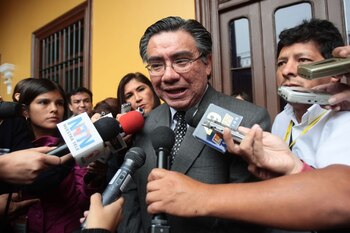
Alberto Fujimori's lawyer, César Nakazaki, spoke on the statement issued by the Inter-American Court of Human Rights (IACHR), which orders the Peruvian State refrain from complying with the ruling of the Constitutional Court (TC), which reinstates his pardon in favor of the former president.
“It was predictable, the statement is official. But it must be clarified that this is not a precautionary measure, but it is an emergency measure that is adopted only by the president, not yet by the court. The President of the Court has in cases of extreme urgency and serious damage, he can take this very exceptional measure,” he told Canal N.
“The Supreme Court has to be notified, and it is the call to decide whether or not it will abide by this measure. (...) Yesterday I communicated, because the Government has certainly not done so, that there have been an appearance with restrictions and an impediment to exit for 18 months, which, in our opinion, would be more than enough to satisfy the Court these days which remain until the substantive issue is evaluated,” he said.
Nakazaki explained that, in the absence of a resolution, since the IACHR has only issued a statement in a statement, the Supreme Court cannot fail to comply with the Court's ruling Constitutional.
“According to the Constitution, a ruling of the TC is executed yes or yes. The IACHR does not work all year round, it works for periods, and is now in the hearing period. I had already scheduled to see the Barrios Altos case on April 6, now in fact they are going to see the whole issue of the pardon that date and it will be official,” he said.
For the defense of the former president, the pronouncement of the Inter-American Court of Human Rights could be conditioned on an “ideological bias”.
“It's a sign of an ideological bias, unless you don't have the complex information. He trusted that he was not informed because he would not be able to meet the requirements. I don't see a legal form in which they can say that Alberto Fujimori, under the current conditions, generates a great danger of leaving the country, already with these two precautionary measures that have been issued,” he said.
Finally, he said that Fujimori Fujimori will not be released, at least, until April 6, when the IACHR will consider the case and define the future of the former president.
“PERUVIAN STATE MUST ABIDE BY ORDER OF THE IACHR”
For the constitutionalist Aníbal Quiroga, the Government must abide by this requirement and suspend the release of the former president, who for bureaucratic reasons is still inside the Barbadillo prison in Ate.
“Peru has been subject to the contentious jurisdiction of the IACHR Court since January 81. We signed a treaty that binds us, which is why the Court has more authority than the internal courts, including the TC,” he told Canal N.
“A request has been received for the provisional suspension of the execution of the nullity of the annulment and the restitution of the pardon, ordering the Peruvian State to refrain from executing this release until the Court decides that provisional or precautionary measure,” he said.
For this reason, the State must suspend the procedures for the release of Fujimori Fujimori on the spot. “According to a law that Peru gave at the time of Alejandro Toledo, these decisions are carried out directly without the need for validation or other procedures. They are executed as if they were an order of the highest court of justice,” Quiroga said.
“The release will no longer be able to be given. The Inter-American Court of Human Rights is superior to the Constitutional Court and has ordered it to refrain from executing it,” he added.
When asked whether the Peruvian authorities can ignore this request of the IACHR, the constitutionalist explained that the possibility is possible, since there is no “international police” to force its execution.
However, the expert pointed out that he does not believe that the Peruvian State ignores this order because of the position previously expressed by the Executive on the release of the former president. “I would venture to say that it is a decision of the Court that is in line with what the Government thinks, so the order will be executed quickly and with great joy,” he said.
KEEP READING:
Últimas Noticias
Debanhi Escobar: they secured the motel where she was found lifeless in a cistern

The oldest person in the world died at the age of 119

Macabre find in CDMX: they left a body bagged and tied in a taxi
The eagles of America will face Manchester City in a duel of legends. Here are the details

Why is it good to bring dogs out to know the world when they are puppies




